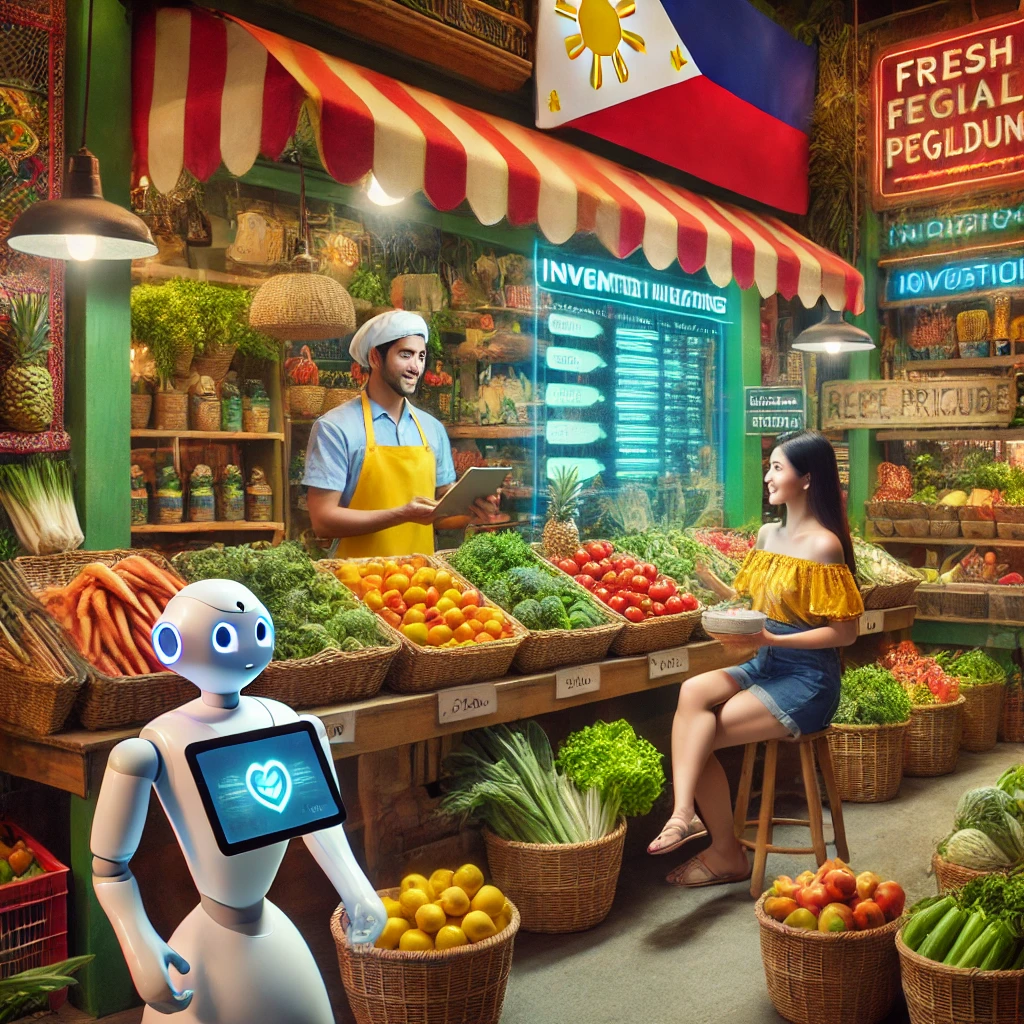Artificial General Intelligence (AGI) represents the next frontier in artificial intelligence, designed to perform any intellectual task that humans can, but faster and more efficiently. While AGI might seem like a futuristic concept reserved for tech giants, its potential applications extend even to small businesses, such as a humble vegetable store in the Philippines. By leveraging AGI, local vegetable stores can enhance their operations, reduce costs, and increase profits.
1. Optimized Inventory Management
One of the biggest challenges for vegetable stores is managing inventory. Overstocks lead to spoilage, while understocks disappoint customers. AGI can analyze historical sales data, weather forecasts, market trends, and even local events to predict demand accurately. This ensures that the store stocks the right amount of vegetables at the right time, minimizing waste and maximizing sales.
Example:
An AGI system could suggest ordering extra tomatoes before a town fiesta, anticipating increased demand for salads and stews. Similarly, it could recommend reducing leafy greens during a typhoon forecast, when foot traffic might decrease.
2. Dynamic Pricing for Maximum Profit
AGI can enable dynamic pricing strategies by analyzing supply, demand, and competitor prices in real-time. It can suggest price adjustments that maximize profits while remaining competitive. This approach allows the store to capitalize on high-demand periods without alienating customers.
Example:
If a neighboring store runs out of onions, AGI could recommend a slight price increase, balancing customer satisfaction and profit margins.
3. Enhanced Customer Engagement
AGI-powered tools can personalize customer interactions, making shopping more enjoyable and increasing loyalty. For instance, an AGI chatbot integrated into the store’s Facebook page or a mobile app could answer customer queries, suggest recipes, or provide health tips based on the vegetables available.
Example:
A customer searching for malunggay could receive recipes for tinola or suggestions for nutritional benefits, encouraging larger purchases.
4. Efficient Supply Chain Management
AGI can streamline the store’s supply chain by identifying the best suppliers, negotiating optimal prices, and ensuring timely deliveries. It can also monitor fuel prices, road conditions, and logistical bottlenecks, suggesting cost-effective transportation options.
Example:
An AGI system could recommend sourcing carrots from a nearby farm during peak harvest season to reduce costs while ensuring freshness.
5. Predictive Maintenance for Equipment
If the store uses refrigeration units or weighing scales, AGI can monitor these systems to predict and prevent breakdowns. This avoids costly repairs and ensures continuous operation.
Example:
AGI could alert the owner to unusual patterns in energy consumption, indicating that a refrigerator might need servicing soon.
6. Marketing and Promotions
AGI can analyze customer data to design targeted marketing campaigns. It can recommend discounts, bundle deals, or promotional events based on customer preferences and local trends.
Example:
During the school opening season, AGI could suggest offering discounts on vegetables commonly used in packed lunches, such as carrots, cabbage, and squash.
7. Local Community Insights
AGI can integrate data from social media and local news to keep the store owner informed about community preferences and events. This ensures the store stays relevant and meets customer needs effectively.
Example:
If a local health campaign emphasizes eating more vegetables, AGI could suggest highlighting the nutritional benefits of store offerings through signage or social media.
8. Sustainability Practices
AGI can help the store adopt sustainable practices, such as reducing plastic waste or finding uses for unsold produce. This not only benefits the environment but also appeals to eco-conscious customers.
Example:
AGI could recommend partnering with local composting initiatives or creating vegetable bundles from surplus stock to reduce waste.
9. Financial Management
AGI tools can track expenses, predict cash flow, and provide financial advice to ensure profitability. This empowers the store owner to make informed decisions about investments or expansions.
Example:
An AGI system could highlight that profits peak during certain months, suggesting when to allocate extra funds for expansion or marketing.
10. Competitive Advantage
By adopting AGI early, the vegetable store positions itself as a forward-thinking business. This creates a unique selling point that can attract tech-savvy customers and investors.
Conclusion
While AGI may seem like an advanced technology, its applications are practical and accessible, even for small businesses like vegetable stores in the Philippines. By optimizing inventory, pricing, supply chain, customer engagement, and more, AGI offers a powerful tool to boost profits and sustainability. Investing in AGI solutions today can ensure that vegetable stores not only thrive but also lead the way in modern retail practices.
With the right AGI tools and strategies, a simple vegetable store can transform into a smart, profitable business ready for the future.
[SEO optimized]


